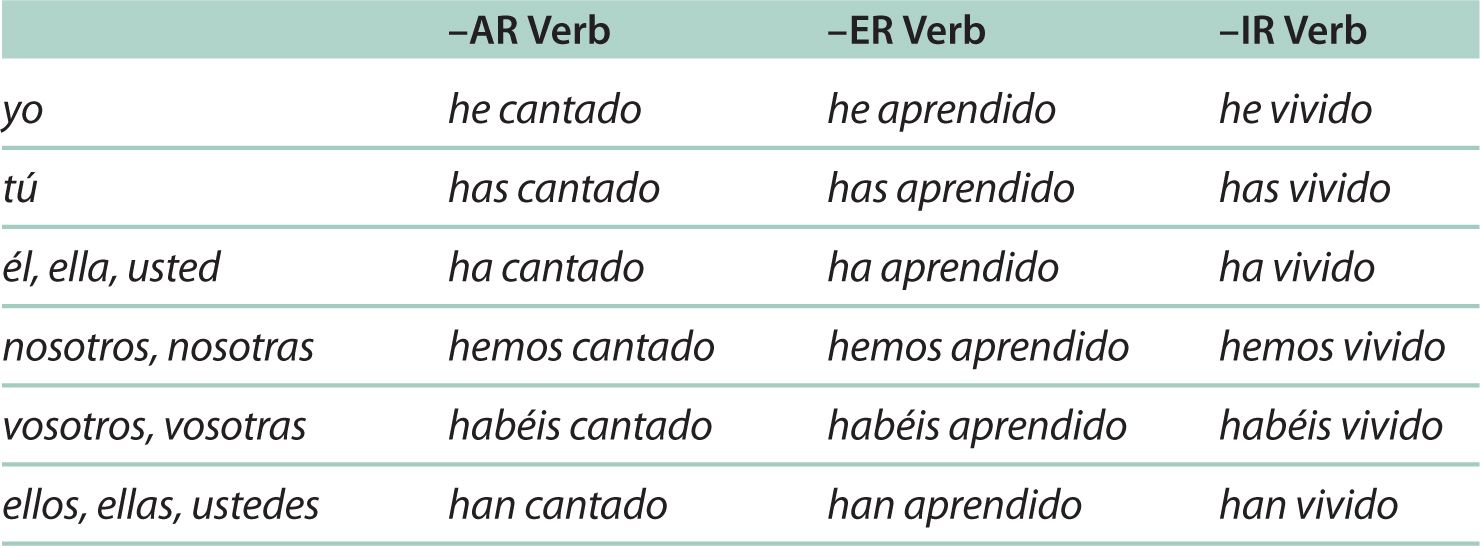In this lesson, we will learn how to form and use the present perfect tense in Spanish.
Spanish present perfect tense
How to form?
In English, the present perfect is formed by combining the auxiliary verb "have" or "has" with the past participle.
In Spanish, it is formed by using the present indicative of the auxiliary verb “haber” and the past participle of verb.
Below you will find the present conjugations of haber.
| Subject | Haber |
| Yo | He |
| Tú | Has |
| Él / Ella | Ha |
| Nosotros | Hemos |
| Vosotros | Habéis |
| Ellos | Han |
- To form the past participle for regular "ar" verbs, simply remove "ar" and replace it with "ado"
For example:
Hablar - Hablado
- To "er" and "ir" verbs, remove "ar" or "ir" and replace it with "ido". For example, Conocer - Conocido
Él ha dormido 10 horas - He has slept 10 hours
Ellos han bailado en 12 países - They have danced in 12 countries
Usted ha escrito un poema bonito - You have written a pretty poem

Verb conjugation in the present perfect tense
To make it negative, simply add the word "no" before the conjugated form of "haber", or before the indirect object pronoun.
For examples:
No hemos comido - We have not eaten
Pablo no le ha dado mucho dinero a su hermana - Pablo has not given a lot of money to his sister
Note: The auxiliary verb and the past participle are never separated. So if an object pronoun is used with the present perfect, it goes right before the auxiliary verb "haber".
For examples:
¿Los has visto? - Have you seen them?
Pablo le ha dado mucho dinero a su hermana - Pablo has given a lot of money to his sister
See also: Spanish present simple tense
When to use the present perfect tense in Spanish?
- To talk about things that started in the past and continue or repeat in the present.
For example:
Diego ha sido mi amigo por veinte años - Diego has been my friend for 20 years
- To talk about things that have happened in the recent past.
- To talk about things that started and stopped at two defined points in time.
- To talk about things that continued for a long period of time, it isn’t obvious when it started and stopped but it is no longer happening in the present.
For examples:
La empleada ya ha limpiado la casa - The maid has already cleaned the house
¿Han salido ya las mujeres? - Have the women left yet?
¿Has probado el chocolate alguna vez? - Have you ever tried chocolate?
Me he cepillado los dientes - I have brushed my teeth
Since the present perfect tense requires an event to start (often recently) and continue into the present moment, there will be phrases that trigger the present perfect.
- Today - Hoy
- This morning, this afternoon, this evening – Esta mañana, esta tarde, esta noche
- This week, this month, this year – Esta semana, este mes, este año
- Lately, recently – Últimamente, recientemente
- Never, ever – Nunca, jamás
- Already, still – Ya, todavía
- Sometime, a few times, several times, -times – Alguna vez, algunas veces, varias veces, -veces
For examples:
I have tried to stop smoking several times - He intentado dejar de fumar varias veces
I have already done exercise - Ya he hecho el ejercicio
I have never tried octopus - Nunca he probado el pulpo
